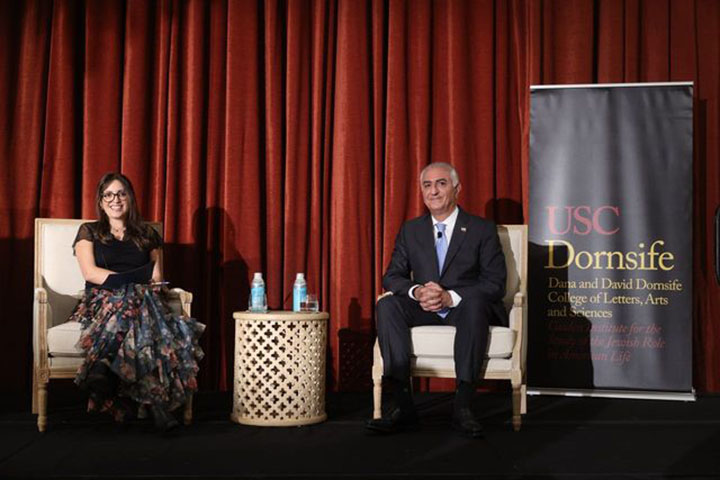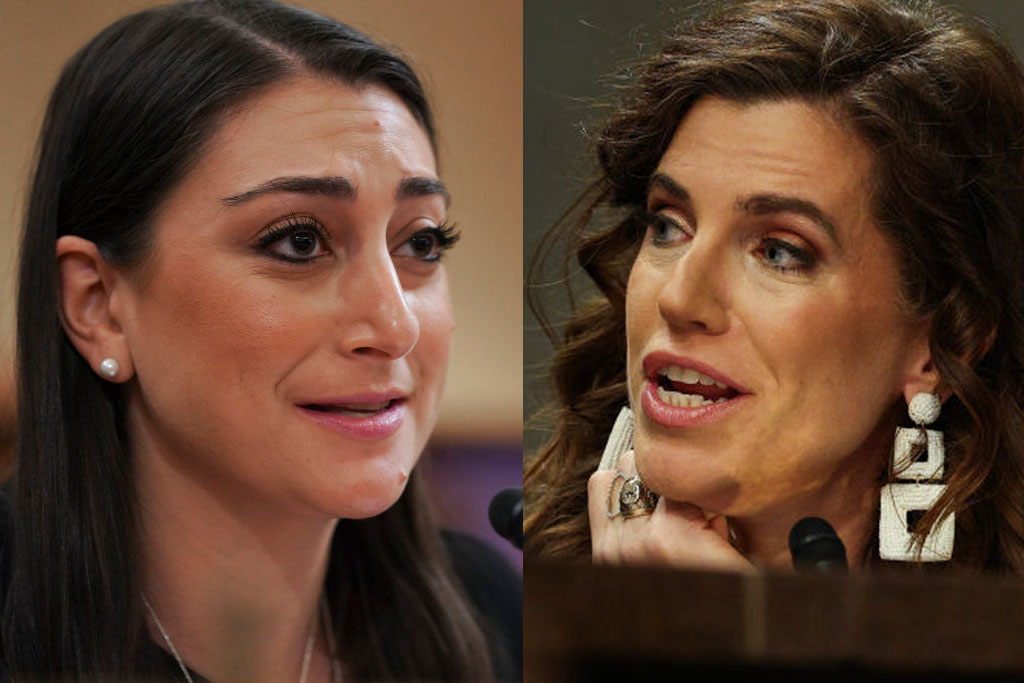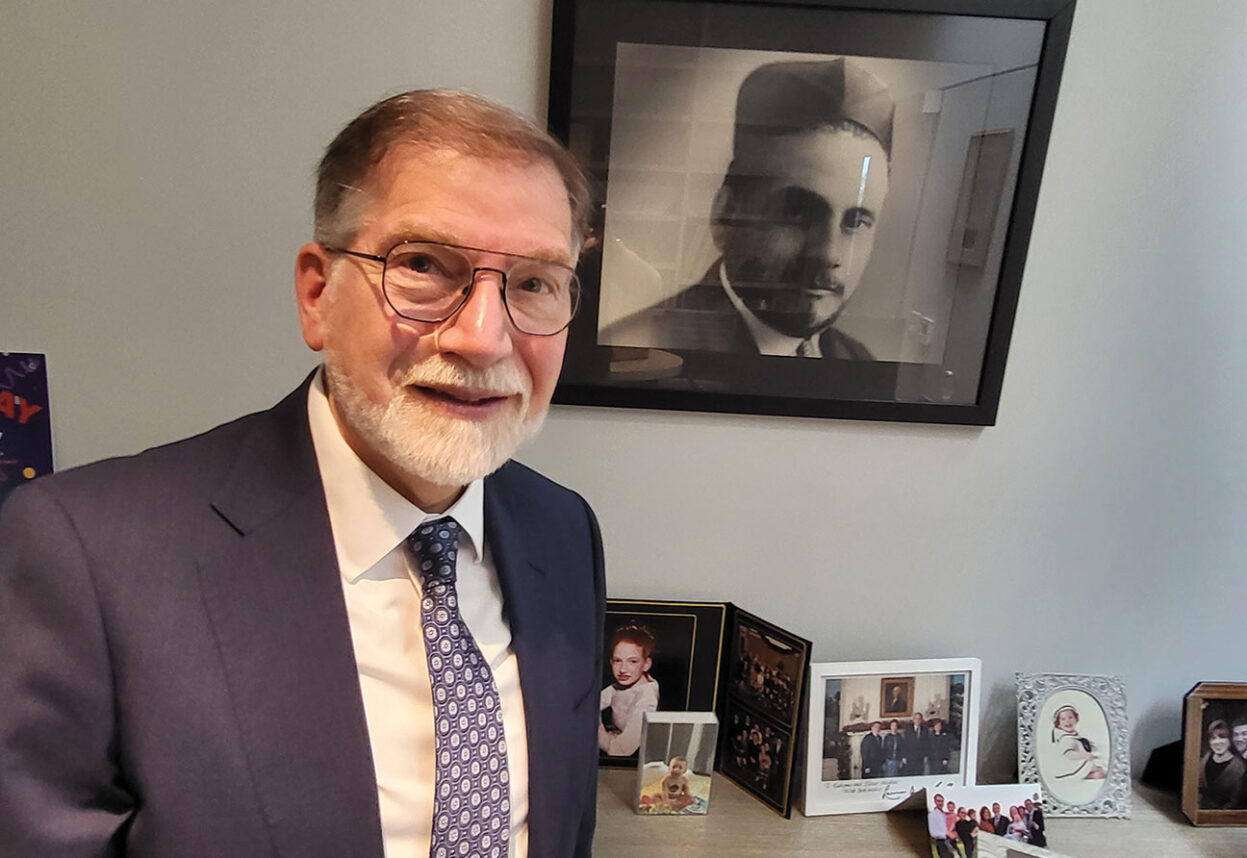Once, when Bernie Brillstein’s career as a Hollywood manager was already so well established that people tried to hustle him, rather than the other way around, Lorne Michaels sent Bernie a gift.
The present was a Langdon Clay photograph of Broadway near 42nd Street in New York, a location that held much significance for Brillstein. It was not the block he grew up on — as a child he lived in the El Dorado building at 90th and Central Park West. Nor was it the place where he saw his first show or signed his first client. Rather, it was the location that established the basis for his business ethos.
On this block, Brillstein stole a carton of balloons when he was 14. Then, at his father’s urging, Brillstein gave the balloons back. The incident made him appreciate the value of integrity over stealthy, dishonest victories. The lesson has served him well over 51 years in show business, as a manager and producer. Brillstein’s ethics and ability kept actor Chris Farley as a client even after Farley lost the promised title role in “The Cable Guy” to Jim Carrey. And it’s why puppeteer Jim Henson handed Brillstein a $7 million check with the promise of another $3 million and $500,000 a year for life to be his manager. In Hollywood, where navigating deception and ego is usually the job of a ruthless shark, Brillstein’s modus operandi of candor and caring made him worth a lot of money.
It also earned Brillstein the sort of respect that will bring him out of the dealmaking background and into the public eye this month when he receives the Visionary Award at the opening gala of the Israel Film Festival on Nov. 30.
“I was always told that Bernie was the epitome of honesty and straightforward business dealings, and that was a huge allure to me,” said comedian Martin Short, a Brillstein client. “You don’t last as long as Bernie has in the position that Bernie has without being fair and kind to people.”
In his publicity photos, the 75-year-old Brillstein, who will receive the Visionary Award at the opening-night gala of the 21st annual Israel Film Festival, appears etched in gravitas, with a Sean Connery-esque piercing gaze and well coiffed hair. In person, Brillstein comes off as avuncular and cuddly, like a grandfather who reads stories to his grandchildren by the fireplace.
The back mantelpiece of his spacious office is covered in framed photographs, like those of John Belushi and Gilda Radner. In a glass case is “Bernie Muppet” — a Brillstein-inspired puppet that Jim Henson made for him, complete with beard, the bushy eyebrows and ever-present phone at ear.
There’s no computer: “I’m not mechanical,” he explained.
He dresses casually: a blue V-necked sweater stretched over rolls of belly, black, thick-rimmed glasses and striped socks. Throughout most of his career Brillstein eschewed power dressing because his girth didn’t allow it. On his first day in show business, as a 24-year-old punk in the William Morris mailroom, he wore a suit because, as he wrote in a memoir, “Even a newcomer has to look as good as possible, which in my case, being so heavy, was never that good, or that possible.”
But as he put it in another book, “No one is ever scared of a fat man.” Which gave him a leg up and also the wisdom to exhort people to accept who they are and use it to their advantage.
From his early years, as a preteen prowling the top New York nightclubs, to his later years as a Hollywood mogul, Brillstein always looked for an edge. Like a Sammy Glick with heart, Brillstein was aggressive, hardworking, with a peripheral gaze that could identify opportunities to pounce on. His trajectory is almost clichéd, starting with that first job in the mailroom.
“I am a lot of things, but I am not tough,” said Brillstein in an interview. “I go through life with a smile. It is much easier for me.”
It’s a slightly disingenuous statement coming from a man who fights tooth and nail for his clients, walks out of deals he doesn’t like, and screams with the best of them when his clients’ interests are on the line.
“He is the kind of guy who can explode with someone on the phone, and at the same time, while you are in his office, turn and wink at you,” Short said.
But the necessities of business have always been secondary to his affection for performers and their craft.
“Without a question, the high point of our relationship is our relationship,” said actor Rob Lowe, a Brillstein client who spoke with The Journal from London, where he is appearing in a play. “There isn’t a day that goes by where I don’t talk to him, and it is usually two or three or more times a day…. Bernie loves the show of business more than the business of show. He is passionate. He loves artists.”
Bernie Brillstein grew up as the prototypical striving Jew who dreamed of show business. Brillstein and his parents, Moe and Tillie, lived with his uncle, Jack Pearl, an NBC radio comedian. They had a Christmas tree and didn’t keep kosher, but Yiddish was spoken, and Moe Brillstein was passionate about Israel and the Millinery Center Synagogue, a temple he founded on Sixth Avenue between 38th and 39th streets, so that people in the garment district would be able to say Yizkor.
Moe and Tillie had a volatile marriage, full of shouting and arguments. Tillie was a depressive, who spent her life in bed, doped up on pills. Uncle Jack took 10-year-old Bernie under his wing, bringing him to East Side clubs and restaurants, like the Stork Club, and Toots Shor’s. Moe took Bernie to the West Side clubs, like the Copacabana and the Latin Quarter.
“At Toots Shors I met Joe DiMaggio,” Brillstein said. “I met great politicians. I met Frank Costello for God’s sake. New York — I saw it at its best. I really saw it for what it was. And if you can make it there, you can make it anywhere.”
As a teenager, Brillstein already knew that if he slipped in through the kitchen, he could watch shows for free. If the maitre d’ happened to walk past, $5 would secure his viewing perch.
“When I was 16, I saw Dean Martin and Jerry Lewis, and that made me decide to go into show business,” Brillstein said. “They were fantastic. And I saw them 21 nights in a row at the Copacabana. I could do their act. I thought I would never see anything like that again — and I never have, really.”
During his stint in the Army, Brillstein told a lieutenant that he had been “producing shows all my life!” and secured a gig producing morale-boosting productions. It was after his soldiering that Brillstein got his mailroom job at William Morris, and quickly moved up.
“You politicize. You walk around. You’re charming. You do what you are supposed to do. You ingratiate yourself to some of the agents,” Brillstein said. “I ingratiated myself to the head of publicity because I knew that his assistant was leaving. He did, and I got the job.”
Brillstein became head of publicity, and later, an agent in the advertising department. He took his job seriously, refusing to treat commercials as inferior to television and movies, which was the prevailing view at William Morris. Although he was Jewish, he charmed the “white bread of white bread” female executives at the Madison Avenue advertising firms. He took them to the clubs he was so familiar with; they took him to museums. And they brought him business. When they needed to book a celebrity for their commercials, they had Brillstein do it so that he could get the commission.
The suits at William Morris started disliking Brillstein’s radical style. For one thing, he didn’t wear a suit. And it was unorthodox when he booked nonagency talent for gigs, even though he also made sure the agency got the commission. And he sold a TV show on his own. After 10 years, he quit.
“It was not the place for me,” he said. “It was not aggressive.”
He became a talent manager, signing young comedians. He moved out to California in 1967 to start infiltrating the television business. When he couldn’t sign the big stars, he concentrated on writers, directors and producers.
“Bernie helped create the role of manager in Hollywood,” said William Morris CEO Jim Wiatt. “He is old school, making it work in a contemporary environment.”
An early labor of love was the career of Jim Henson, who’d been a client at William Morris. Three months after Brillstein left, Henson joined him. Brillstein negotiated the deal with Henson and the Children’s Television Workshop, which resulted in “Sesame Street.” He also persuaded Henson to license his puppet characters (which brought in millions in income). And Brillstein persevered in pitching “The Muppet Show,” even after the networks told him that a frog couldn’t host in prime time.
At The Brillstein Company, his stable eventually included “Saturday Night Live” creator Lorne Michaels, Norm Crosby, John Belushi, Gilda Radner, Chris Farley and Phil Hartman.
“I figured that if I represented five comedians, what the first one couldn’t do, maybe No. 4 could,” he wrote in ” Where Did I Go Right?: You’re No One in Hollywood Unless Someone Wants You Dead” (Warner, 2001) “But on the most basic level, my reason for having multiple clients is that I simply don’t trust show business.”
His calmness as a septuagenarian Hollywood survivor belies his early insecurities. He worried perpetually about losing his income, even when he made enough to own a Beverly Hills mansion and to travel on the Concorde once a week to catch “The Muppet Show” in London. One day when he couldn’t get through to Jim Henson on the phone, he had a panic attack and passed out on a chair near the pool of his London hotel.
As Brillstein’s career was soaring, his personal life was dipping and diving. He divorced his first wife, Marilyn, six months after their first child, Leigh, was born, in the late 1950s. His started dating his second wife, Laura, while she was still married to her first husband. Once they married and moved to California, things turned sour. According to Brillstein, Laura “behaved abominably” to his daughter, Leigh, and she also didn’t know how to handle his clients. His next marriage, to Debbie, lasted 20 years. They had two children together and also reared two children from Debbie’s first marriage. Debbie, he said, finally left him for a man she met on the Internet.
“I’m amazed it lasted that long, since I was usually so buried in business that I didn’t give my private life a fair shake,” he wrote.
Now Brillstein is married to Carrie, whom he describes as “fantastic.”
His business also brought periodic heartbreak. Belushi and Farley, who were clients as well as friends, died of drug overdoses. Radner succumbed to ovarian cancer; Henson to bacterial pneumonia.
“I was overwhelmed with the finality of it all,” he wrote. “It was like burying my own children.”
Brillstein’s current gig is founding partner at Brillstein-Grey Entertainment, which he formed with Brad Grey in 1992. It represents, among others, Brad Pitt and Adam Sandler, and produces TV shows, including “The Sopranos.”
Brillstein, who also wrote the recently released “It’s All Lies, and That’s the Truth” (Gotham Books), still manages 16 clients personally — including Michaels, Lowe and Short. And he’s producing the television show, “Heist,” for NBC. For the most part, the difficult times are over for Brillstein. He can relish the skills of his clients and the challenges of his craft as dealmaker and manager without the anxiety that once plagued him.
“People don’t expect me to do the shlepping,” he said. “I can be creative and have fun.”































